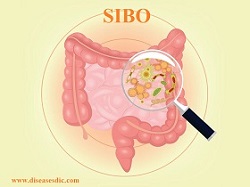

Your doctor will prescribe medication that you may need to take long-term to reduce and manage bacteria in your small intestine. AntibioticsĪntibiotics are generally the first step of SIBO treatment. Treatment can include a regimen of antibiotics, surgical repair, and nutritional support. Treatment for Small Intestine Bacterial Overgrowth usually involves treating the underlying condition causing SIBO. Excess bacteria in the small intestine can reduce the normal absorption rate of nutrients into your body. A low rate of absorption can suggest SIBO.

Your doctor will collect a stool sample to test for your body’s absorption of fat. Anemia is when your blood lacks enough red blood cells to convey oxygen to your body, which often results in fatigue. Your doctor will take a small sample of your blood to test for a lack of nutrients or anemia.
#Small intestine bacterial overgrowth symptoms series#
For this test, your doctor will ask you to fast the night before, to consume a sweet drink and to breathe into a series of tubes or medical balloons at intervals for 2-3 hours. The breath test can detect high levels of hydrogen or methane, two gases released by surplus bacteria in the small intestine. Breath testĪ SIBO breath test is a noninvasive test that can be administered in a doctor’s office or at home. There are treatments for SIBO and sometimes changing lifestyle habits is enough to resolve the condition. Your doctor may also order additional tests such as breath, blood, stool, or other tests (like X-rays) that will help them with a SIBO diagnosis. The physical exam may include your doctor gently applying pressure to your abdomen. During the appointment, your doctor will conduct a routine physical exam, ask about your symptoms, and explore your medical history. We recommend that you schedule an appointment with your doctor if you have any of the symptoms of Small Intestine Bacterial Overgrowth. This can lead to Small Intestine Bacterial Overgrowth. One of these pouches is a dead end, known as a blind loop, where bacteria can collect. During bariatric surgery, doctors divide the small intestine into two pouches. Post-Bariatric Surgery Patients might experience SIBO. Why Does SIBO Occur in Post-Bariatric Surgery Patients? A few of these medical conditions are radiation enteritis, scleroderma, Crohn's disease, celiac disease, and diabetes.

The symptoms of Small Intestine Bacterial Overgrowth (SIBO) are similar to the symptoms of other digestive issues such as lactose intolerance and Irritable Bowel Syndrome. SIBO is also referred to as Small Intestinal Bacterial Overgrowth and Blind Loop Syndrome. The excess bacteria can either be bacteria normally found in the small intestine or bacteria not normally found there.

Small Intestine Bacterial Overgrowth (SIBO) is an unexpected surge in bacteria in the small intestine. What is Small Intestine Bacterial Overgrowth (SIBO)?


 0 kommentar(er)
0 kommentar(er)
